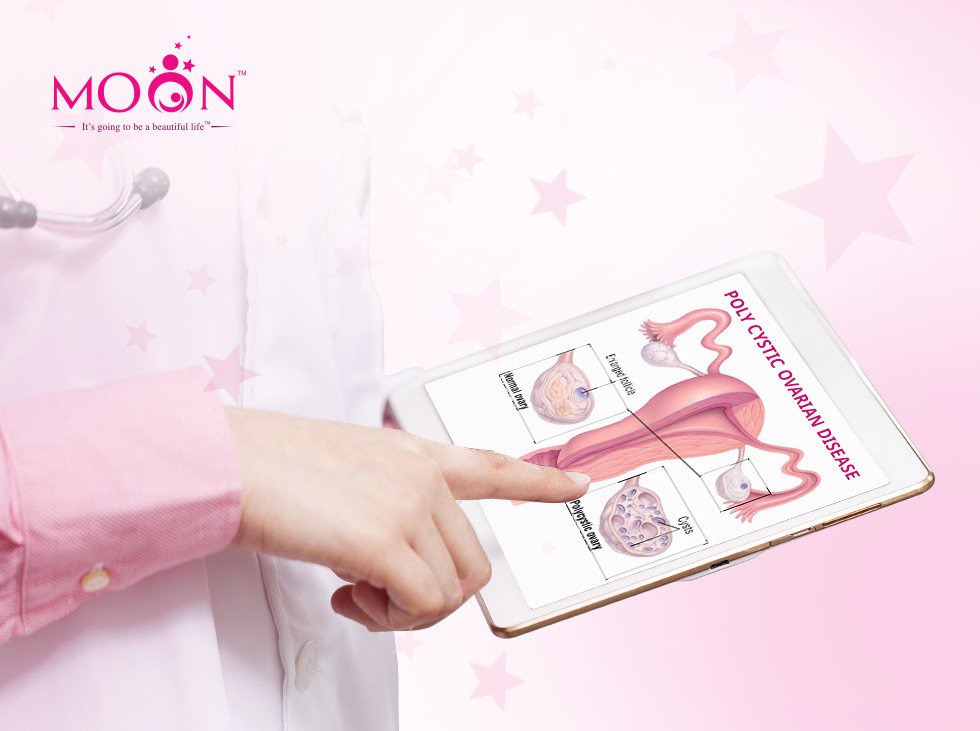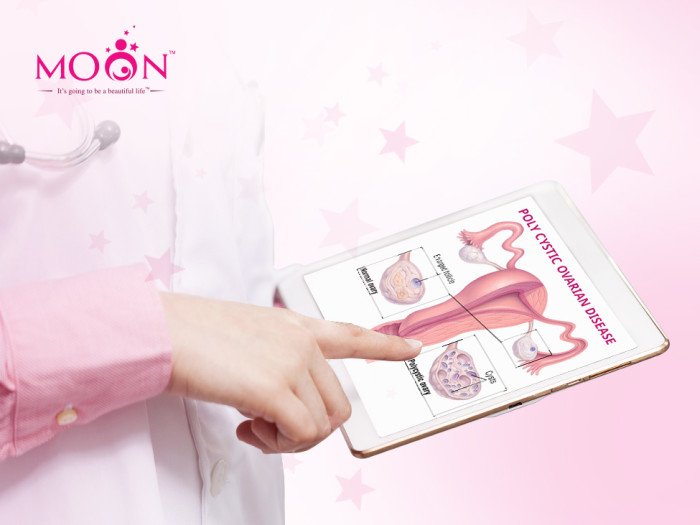
Polycystic ovary syndrome is a problem in which a woman’s hormones are out of balance. It can cause problems with periods and make it difficult to get pregnant. If it isn’t treated, over time it can lead to serious health problems, such as diabetes and heart disease.
It was first described by Stein and Leventhal in 1935. Gynaecologists often see it as a gynaecological problem, with the ovaries being the primary organ affected. However, it’s a multisystem disorder, with the primary problem lying in hormonal regulation in the hypothalamus, with the involvement of many organs. The name PCOD is used when there is ultrasonographic evidence. The term PCOS is used since there is a wide spectrum of symptoms possible, and cysts in the ovaries are seen only in 15% of people.
The prevalence among Indian women has been estimated by various studies to be between 5 to 10%. Some studies have even estimated it to be as high as 22%. Exact prevalence may be still higher. Though women usually experience symptoms right from menarche, the highest frequency is reported in the mid-twenties, with mean age at diagnosis among Indian women being 22 years.
Most women with PCOS grow many small cysts on their ovaries. That is why it is called polycystic ovary syndrome. The cysts are not harmful but lead to hormone imbalances. These “cysts” are actually immature follicles not cysts. The follicles have developed from primordial follicles, but the development has stopped (“arrested”) at an early antral stage due to the disturbed ovarian function. The follicles may be oriented along the ovarian periphery, appearing as a ‘string of pearls’ on ultrasound examination. Early diagnosis and treatment can help control the symptoms and prevent long-term problems.
Hormones are chemical messengers that trigger many different processes, including growth and energy production. Often, the job of one hormone is to signal the release of another hormone. For reasons that are not well understood, in PCOS the hormones get out of balance. One hormone change triggers another, which changes another. The sex hormones get out of balance. Normally, the ovaries make a tiny amount of male sex hormones (androgens). In PCOS, they start making slightly more androgens. This may stop ovulation, cause acne and grow extra facial and body hair. The body may have a problem using insulin, called insulin resistance. When the body doesn’t use insulin well, blood sugar levels go up. Over time, this increases the chance of getting diabetes.
The cause of PCOS is not fully understood, but genetics may be a factor. PCOS seems to run in families, so chance of having it is higher if other women in the family have it or have irregular periods or diabetes. PCOS can be passed down from either mother’s or father’s side.
Symptoms tend to be mild at first. You may have only a few symptoms or a lot of them. The most common symptoms are:
- Fertility problems. Many women who have PCOS have trouble getting pregnant(infertility). Hormone imbalances can cause several types of pregnancy problems and related problems, including Infertility. This happens when the ovaries aren’t releasing an egg every month. Repeat miscarriages, Gestational diabetes during pregnancy. Increased blood pressure during pregnancy or delivery, having a larger than normal or smaller than normal baby, or having a premature baby.
- Acne
- Weightgain and trouble losing weight.
- Extra hairon the face and body. Often women get thicker and darker facial hair and more hair on the chest, belly and back.
- Thinning hair on the scalp.
- Irregular periods. Often women with PCOS have fewer than nine periods a year. Some women have no periods. Others have very heavy bleeding.
- Insulin is a hormone that helps your body’s cells get the sugar they need for energy. Sometimes these cells don’t fully respond to This is called insulin resistance. It can lead to diabetes.
- Depression
Diagnosis of PCOS is done by a detailed history, clinical examination, laboratory evaluation of hormone (free testosterone levels, dehydroepiandrostenedione (DHEA) , follicle stimulating hormone, luteinizing hormone, estradiol, 17-hydroxyprogesterone, prolactin and thyroid hormones) insulin and sugar levels. Ultrasound is done to check the status of the ovaries.
Treatment for PCOS is not curative. Treatment focuses on controlling symptoms and managing the condition to prevent complications. The treatment will vary from woman to woman, depending on specific symptoms and whether you are planning a pregnancy.
Regular exercise, healthy foods, and weight control are the key treatments for PCOS. Treatment can reduce unpleasant symptoms and help prevent long-term health problems. Try to fit in moderate activity and/or vigorous activity often. Eat healthy foods. This includes lots of vegetables, fruits, nuts, beans, and whole grains which supplies body’s nutritional needs, satisfies hunger, and decreases the cravings. Most women who have PCOS can benefit from losing weight. A modest weight loss can improve high androgen and high insulin levels and infertility. Weight loss of as little as 5% to 7% over 6 months can reduce androgen levels enough to restore ovulation and fertility in more than 75% of women who have PCOS.
You may be prescribed birth control pills to reduce symptoms, metformin to help have regular menstrual cycles by decreasing insulin resistance or fertility medicines if you are having trouble getting pregnant. Some women notice an improvement in their acne after using estrogen-progestin hormone pills. Anti-androgens are drugs that reduce male hormone levels. Excess hair growth (hirsutism) slows when high androgen levels decrease. In the meantime, you can remove or treat unwanted hair with either Laser hair removal, in which the hair follicle is destroyed by a laser beam, Electrolysis, in which hair is permanently removed by electric current applied to the hair root, Depilatories, which are chemical hair removal products applied to the skin, Waxing, which pulls the hair out by the root, Shaving, Tweezing, Bleaching. Hair removal methods differ in cost and long-term effectiveness. Before trying one, consult a specialist about risks of infection and scarring.
There is no cure for PCOS, but controlling it lowers your risks of infertility, miscarriages, diabetes, heart disease, and uterine cancer. Regular checkups are important for identifying any PCOS complications, such as high blood pressure, high cholesterol, uterine cancer, heart disease and diabetes. Earlier the PCOS is diagnosed and treated, lower the risk of developing these complications
It can be hard to deal with having PCOS. If you are feeling sad or depressed, it may help to talk to a counsellor or to other women who have PCOS.
AUTHOR :
Dr. Precella T Thomas
MBBS, DGO, DNB, FMAS, Fellowship in ART
Consultant Obstetrician & Gynaecologist
Laparoscopic Surgeon & Infertility Specialist.






October 2, 2016
Thanks-a-mundo for the blog.Really thank you! Want more.
October 4, 2016
Say, you got a nice article.Really thank you! Much obliged.
October 4, 2016
Thank you for your post.Much thanks again. Really Cool.
October 4, 2016
Thanks so much for the article.Thanks Again. Will read on…
October 5, 2016
Looking forward to reading more. Great post.Much thanks again.
October 5, 2016
Very good article.Thanks Again.